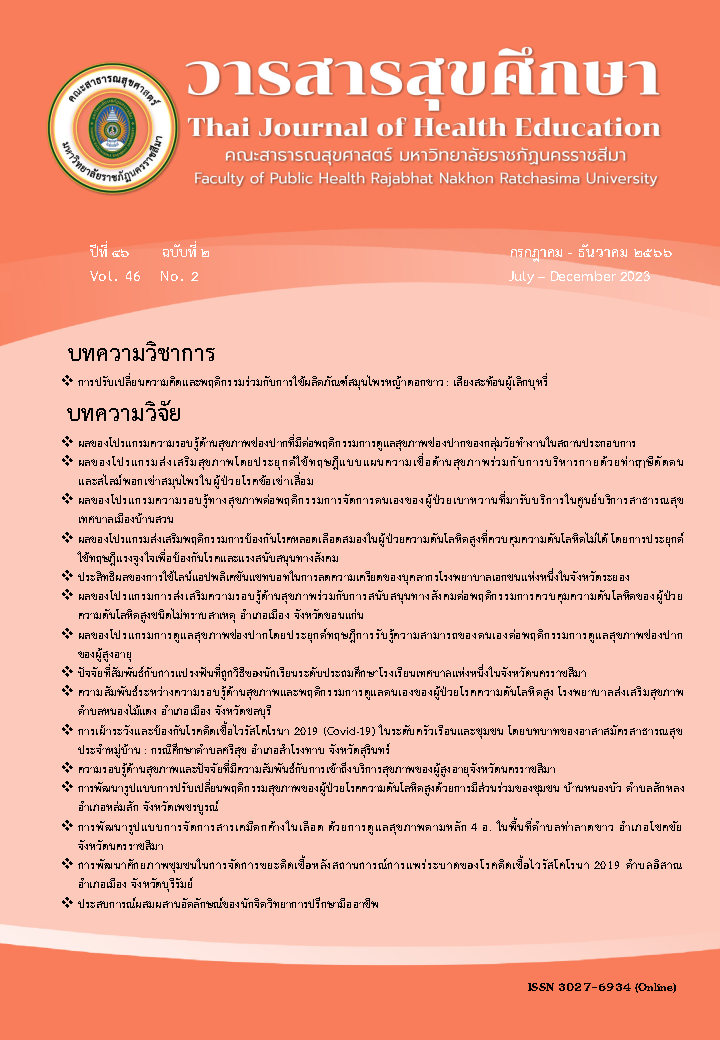Effect of Health Literacy Program on Self-management Behaviors of Diabetic Patients Receiving Services at Ban Suan Municipality Public Health Service Center
Keywords:
Health Literacy, Self-management behaviors, diabetic patientsAbstract
This is quasi-experimental research two-group pre-post-test control group design. Aims to study the effect of a health literacy program on the self-management behaviors of diabetic patients receiving services at the Ban Suan Municipality Public Health Service Center. The sample group consisted of 54 diabetic patients who could not control their blood sugar levels and were treated at the Ban Suan Municipal Health Service Center, Muang District, Chonburi Province, divided into two groups: an experimental group of 27 people and a control group of 27 people. Two types of tools are used in this research: tools used to collect data and tools used in the experiment. The researcher conducted the data collection himself. Data were analyzed by frequency, percentage, mean, standard deviation statistics, paired t-tests, and independent t-tests.
The results showed that the experimental group had a mean of overall self-management behavior at the high level (=75.11, SD = 1.84), and the mean was significantly higher than before the program at the 0.05 level (t=-53.22, p-value <.001; 95%CI -30.159 t0 -27.916)The experimental group that received the health literacy program had significantly higher mean self-management behaviors among diabetic patients than the control group receiving regular nursing care at Ban Suan Municipality Public Health Service Center statistically at the 0.05 level (t=42.71, p-value <.001; 95%CI 19.272 to 21.172). This research suggests that Promoting health literacy for effective self-management should include teaching and learning activities. Practicing contemplation and awareness actual practice will lead to changes in self-management behavior for better diabetes patients.
References
สุวรรณี สร้อยสงค์, อังคณา เรือนก้อน, ขวัญสุวีย์ อภิจันทรเมธากุล, นิลุบล นันตา และจุฑามาศ สุขเกษม. พฤติกรรมการดูแลตนเองตามการรับรู้ของผู้ป่วยเบาหวานชนิดที่ 2 ที่ควบคุมระดับน้ำตาลในเลือดไม่ได้. วารสารวิทยาลัยพยาบาลพระปกเกล้า จันทบุรี 2560; 28(2): 93-103.
สลิดา รันนันท์ และพาพร เหล่าสีนาท. พัฒนาแนวปฏิบัติทางการพยาบาลเพื่อส่งเสริมการจัดการตนเองของผู้ป่วยเบาหวาน ชนิดที่ 2 ที่ควบคุมระดับน้ำตาลในเลือดไม่ได้ โรงพยาบาลกันทรวิชัย จังหวัดมหาสารคาม. วารสารโรงพยาบาลมหาสารคาม 2562; 16(3): 138-148.
กองสุขศึกษา กรมสนับสนุนบริการสุขภาพ กระทรวงสาธารณสุข. แบบประเมินความรอบรู้ด้านสุขภาพและพฤติกรรมสุขภาพ ตาม 3อ. 2ส. ของประชาชนที่มีอายุ 15 ปีขึ้นไป ฉบับปรับปรุงปี 2561. [อินเตอร์เน็ต]. 2561 [เข้าถึงเมื่อ 2565 ต.ค. 20]. เข้าถึงได้จาก: https://www.nkphospital.go.th/th/H.ed/mFile/20180627124613.pdf
อรุณี สมพันธ์ แสงทอง, ธีระทองคำ นพวรรณ, เปียซื่อ และ สมนึก สกุลหงส์โสภณ. ปัจจัยทำนายพฤติกรรมการป้องกันโรคเบาหวานในผู้ที่เสี่ยงต่อเบาหวาน. Rama Nurs J 2558; 21(1): 96-109.
World Health Organization. Health literacy toolkit for low- and middle-income countries: A series of information sheets to empower communities and strengthen health systems. WHO Regional Office for South-East Asia. [Internet]. 2015 [Cited on 2022 Oct. 20]. Available from: https://apps.who.int/iris/handle/10665/205244
จตุพรแต่งเมือง แลเบญจา มุกตพันธุ์. ความสัมพันธ์ระหว่างความฉลาดทางสุขภาพและการดูแลตนเองของผู้ป่วยเบาหวานชนิดที่ 2. วารสารสุขศึกษา 2561; 41(1): 103-113.
กรมควบคุมโรค กระทรวงสาธารณสุข. รายงานประจำปี 2559 (NCD) กรุงเทพฯ: สำนักงานธุรกิจการพิมพ์. องค์การทหารผ่านศึกแห่งประเทศไทยในพระบรมราชูปถัมภ์ 2559.
วรรณรัตน์ รัตนวรางค์ และวิทยา จันทร์ทา. ความฉลาดทางสุขภาพด้านพฤติกรรมการดูแลตนเองกับการควบคุมระดับน้ำตาลในเลือดของผู้ป่วยเบาหวานชนิดที่2 จังหวัดชัยนาท. วารสารวิทยาลัยพยาบาลบรมราชชนนี นครราชสีมา 2561; 24(2): 34-51.
ศูนย์บริการสาธารณสุขเทศบาลเมืองบ้านสวน. รายงานประจำปี 2564. ชลบุรี: ศูนย์บริการสาธารณสุขเทศบาลเมืองบ้านสวน อำเภอเมือง จังหวัดชลบุรี (เอกสารอัดสำเนา) 2564.
Nutbeam, D. The Evolving Concept of Health Literacy. Social Science and Medicine 2008; 67: 2072-2078. http://dx.doi.org/10.1016/j.socscimed.2008.09.050
Kanfer, F. H., & Gaelick-Buys, L. Self-management methods. In F. H. Kanfer & A. P. Goldstein (Eds.), Helping people change: A textbook of methods. Pergamon Press 1991; pp. 305–360.
Faul, F., Erdfelder, E., Buchner, A. et al. Statistical power analyses using G*Power 3.1: Tests for correlation and regression analyses. Behavior Research Methods 2009; 41: 1149–1160. https://doi.org/10.3758/BRM.41.4.1149
สาวิตรี นามพะธาย. ผลของโปรแกรมการจัดการโรคเบาหวานด้วยตนเองต่อพฤติกรรมการควบคุมระดับน้ำตาลในเลือดและค่าน้ำตาลเฉลี่ยสะสมในเลือดของผู้ป่วยโรคเบาหวานชนิดที่ 2 ที่ควบคุมไม่ได้. วิทยานิพนธ์ปริญญาพยาบาลศาสตรมหาบัณฑิต, สาขาการพยาบาลผู้ใหญ่, มหาวิทยาลัยคริสเตียน 2561.
อังศินันท์ อินทรกำแหง. ความรอบรู้ด้านสุขภาพ: การวัดและการพัฒนา = Health literacy: measurement and development. กรุงเทพฯ: พิมพ์ลักษณ์ 2560.
Polit, D. F. & Beck, C. T. Nursing Research: Generating and Assessing Evidence for Nursing Practice (8th ed.). New York: Lippincott Williams & Wilkins 2008.
บุญญธิดา ยาอินทร์. ผลของโปรแกรมส่งเสริมความรอบรู้ด้านสุขภาพต่อพฤติกรรมการดูแลตนเองในผู้ป่วยโรคเบาหวานชนิดที่ 2 ที่ควบคุมระดับน้ำตาลในเลือดไม่ได้ โรงพยาบาลชุมแสง อำเภอชุมแสง จังหวัดนครสวรรค์. สวรรค์ประชารักษ์เวชสาร 2564; 18(1): 35-48.
อัจฉราวดี ศรียะศักดิ์, อติญาณ์ ศรเกษตริน, จินตนา ทองเพชร, วารุณี เกตุอินทร์, ณัฐพร อุทัยธรรม, สุปราณี หมู่คุ่ย และทิพวัลย์ มีทรัพย์. การพัฒนาความรอบรู้ด้านสุขภาพเพื่อจัดการสุขภาพผู้สูงอายุที่มีภาวะเบาหวาน และความดันโลหิตสูงในบริบทคลินิกหมอครอบครัว: กรณีศึกษาในจังหวัดเพชรบุรี. วารสารวิจัยระบบสุขภาพ 2564; 15(2): 155-173.
Anderson, L. W., & Krathwohl, D. R. A taxonomy for learning, teaching, and assessing: A revision of Bloom’s taxonomy of educational objectives. New York: Addison Wesley Longman 2001.
รัตนาภรณ์ กล้ารบ, อรพินท์ สีขาว และชฎาภา ประเสริฐทรง. ผลของโปรแกรมความรอบรู้ด้านสุขภาพที่มีต่อความรอบรู้ด้านสุขภาพพฤติกรรมสุขภาพและน้ำตาลเฉลี่ยสะสมของผู้ป่วยเบาหวานชนิดที่ 2 ที่ควบคุมระดับน้ำตาลในเลือดไม่ได้. วารสารพยาบาลทหารบก 2564; 22(3): 274-283.
Downloads
Published
Issue
Section
License
Copyright (c) 2023 Thai Journal of Health Education

This work is licensed under a Creative Commons Attribution-NonCommercial-NoDerivatives 4.0 International License.



